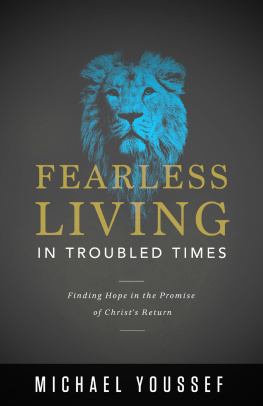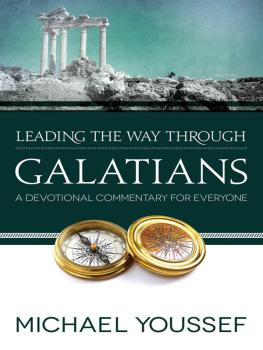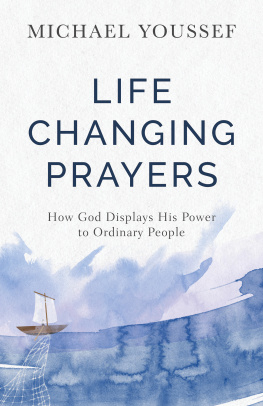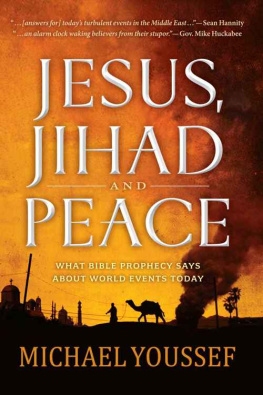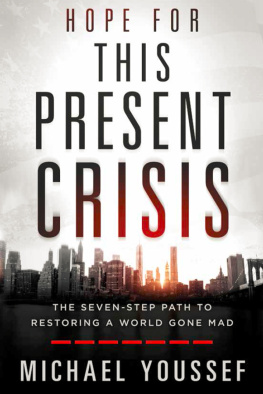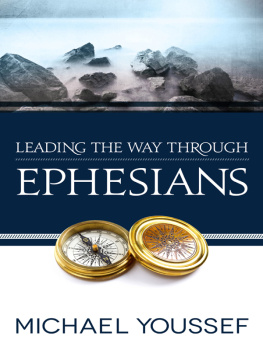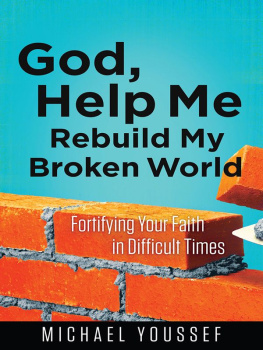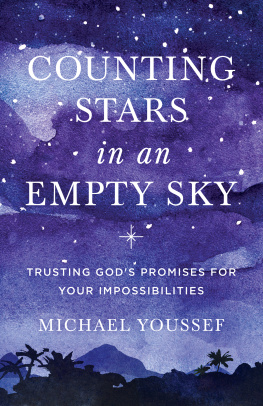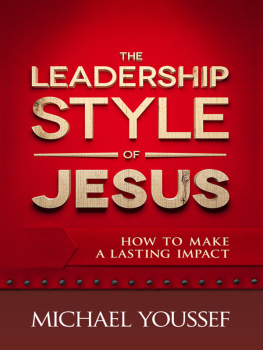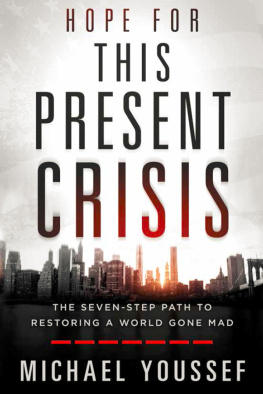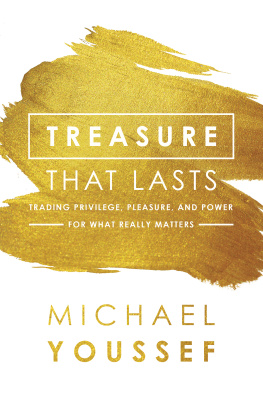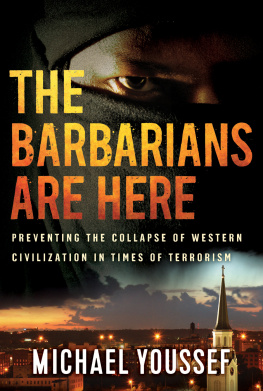Michael Youssef - Fearless Living in Troubled Times
Here you can read online Michael Youssef - Fearless Living in Troubled Times full text of the book (entire story) in english for free. Download pdf and epub, get meaning, cover and reviews about this ebook. publisher: Harvest House Publishers, genre: Religion. Description of the work, (preface) as well as reviews are available. Best literature library LitArk.com created for fans of good reading and offers a wide selection of genres:
Romance novel
Science fiction
Adventure
Detective
Science
History
Home and family
Prose
Art
Politics
Computer
Non-fiction
Religion
Business
Children
Humor
Choose a favorite category and find really read worthwhile books. Enjoy immersion in the world of imagination, feel the emotions of the characters or learn something new for yourself, make an fascinating discovery.
- Book:Fearless Living in Troubled Times
- Author:
- Publisher:Harvest House Publishers
- Genre:
- Rating:4 / 5
- Favourites:Add to favourites
- Your mark:
- 80
- 1
- 2
- 3
- 4
- 5
Fearless Living in Troubled Times: summary, description and annotation
We offer to read an annotation, description, summary or preface (depends on what the author of the book "Fearless Living in Troubled Times" wrote himself). If you haven't found the necessary information about the book — write in the comments, we will try to find it.
Fearless Living in Troubled Times — read online for free the complete book (whole text) full work
Below is the text of the book, divided by pages. System saving the place of the last page read, allows you to conveniently read the book "Fearless Living in Troubled Times" online for free, without having to search again every time where you left off. Put a bookmark, and you can go to the page where you finished reading at any time.
Font size:
Interval:
Bookmark:
I am thankful to God for giving me the privilege of writing this exploration of the great themes of 1 and 2 Thessalonians.
Im also grateful to the Lord for sending me an able editor and compiler of my material in Jim Denney.
Special thanks to the entire team at Harvest House Publishers, who shared my vision and made this dream a reality. Thanks also to Donald W. Gates Jr., founder and principal of the Gates Group, for managing the many details of this project.
I pray that, as I leave this legacy to the next generation, God would raise up a new generation of faithful men and women who would accurately interpret the living Word of God.
To Rick and Andee Swanson, in deep gratitude to God for their faithfulness and true partnership in the gospel of Jesus Christ around the world
W e live in an age of fear, an age that seems poised for the apocalypse.
Rogue nations are going nuclear. Terrorists and jihadists are springing up in our midst, committing senseless mass murders in once-safe cities like Orlando and San Bernardino. Across North Africa and the Middle East, terrorists commit beheadings and other atrocities, then post video of these acts on the Internet to shock the world. Wars ignite across the globe, and rumors of wars spread like wildfire. Fears of climate change are mounting. Resources are dwindling. Strange new diseases are mutating and threatening our children. Racial tensions have led us to the precipice of a race war. The national debt keeps rising, and there is no political will to stop itwhich means that a global economic collapse is just a matter of time.
In the midst of all these threats, we find ourselves living in a post-Christian age, when all of our beliefs and values are under attack from a hostile media, the government, and even our neighbors and coworkers. Yes, we live in an age of fear, a climate of suspense. Its as if the entire world is waiting for Something Big to happensomething terrifying and apocalyptic. In May 2016, the highly respected British daily, The Guardian , published a report on the deepening fear and anxiety throughout our culture:
We live with an epidemic of anxiety. In 1980, 4 percent of Americans suffered a mental disorder associated with anxiety. Today half do. The trends in Britain are similar. A third of Britons will experience anxiety disorder at some stage in their life, with an explosion of reported anxiety among teenagers and young adults. Anxiety, depression, self-harm, attention deficit disorder and profound eating problems afflict our young as never before.
Anxiety has always been part of the human conditionas has depression and tendencies to self-harmbut never, it seems, on this scale. A number of trends appear to be colliding. This is an era when everyone is expected to find their personal route to happiness at the same time as the bonds of society, faith and communitytried and tested mechanisms to support wellbeingare fraying. Teenagers in particularfearful of missing outare beset by a myriad of agonizing choices about how to achieve the good life with fewer social and psychological anchors to help them navigate their way. Who can blame them if they respond with an ever rising sense of anxiety, if not panic?
The Guardian concludes that this mood of spreading fear is due to a fraying of the bonds of society, faith and community. We are witnessing the collapse of the family, social structure, and the community, with the result that people feel increasingly vulnerable and fearful.
But God does not want his people to be anxious or afraid. For believers like you and me, these times are reminiscent of another time in history. In spite of superficial differences of supersonic travel, high-tech media, and the Internet, the twenty-first-century world exhibits many surprising parallels to the first-century world of the New Testament writers.
Fear was rampant in the first century. Crime, terrorism, plagues, famines, and wars were a constant fact of life in that era. Political oppression was the order of the day throughout the iron-fisted Roman empire. Christians in the first century were specially singled out for persecutionwhich often involved the arrest of entire families, followed by horrifying tortures and martyrdom. Those were troubled times, and Paul wrote two letters of encouragement to the church he founded in Thessalonica during his second missionary journeyencouragement to live faithfully and fearlessly in the midst of those dangerous times.
The Greek city of Thessalonica was ancient even in Pauls day, having been founded around 315 BC by King Cassander of Macedon. He named it after his wife Thessalonike, the half-sister of Alexander the Great. The Thessalonian believers were a model of faithfulness, living in a culturally important city with a substantial population of Hellenized Jews (that is, Jews who had been culturally influenced by the Greeks).
Acts 17 tells the story of how Paul founded the Thessalonian churchand how he escaped being murdered by an angry Thessalonian mob:
When Paul and his companions had passed through Amphipolis and Apollonia, they came to Thessalonica, where there was a Jewish synagogue. As was his custom, Paul went into the synagogue, and on three Sabbath days he reasoned with them from the Scriptures, explaining and proving that the Messiah had to suffer and rise from the dead. This Jesus I am proclaiming to you is the Messiah, he said. Some of the Jews were persuaded and joined Paul and Silas, as did a large number of God-fearing Greeks and quite a few prominent women.
But other Jews were jealous; so they rounded up some bad characters from the marketplace, formed a mob and started a riot in the city. They rushed to Jasons house in search of Paul and Silas in order to bring them out to the crowd. But when they did not find them, they dragged Jason and some other believers before the city officials, shouting: These men who have caused trouble all over the world have now come here, and Jason has welcomed them into his house.
They are all defying Caesars decrees, saying that there is another king, one called Jesus. When they heard this, the crowd and the city officials were thrown into turmoil. Then they made Jason and the others post bond and let them go.
As soon as it was night, the believers sent Paul and Silas away to Berea. On arriving there, they went to the Jewish synagogueBut when the Jews in Thessalonica learned that Paul was preaching the word of God at Berea, some of them went there too, agitating the crowds and stirring them up (Acts 17:1-10,13).
As is often the case, those who hated the gospel persecuted the messenger. They wanted to kill Paul, but he got out of Thessalonica just in time. He left behind many faithful believers, and it broke his heart. He dearly loved the Thessalonians who had received the gospel of Jesus Christ with joy and sincerity. He looked forward to returning to Thessalonica to spend more time with them and to help establish them in the faith.
Paul wrote 1 Thessalonians in AD 51 or 52, and it was probably the first of all Pauls letters to the churches (though some Bible scholars think Galatians might have been written before 1 Thessalonians). If 1 Thessalonians was written first, it would be the oldest book in the New Testament. Pauls next letter, 2 Thessalonians, was probably written within a few months of the first.
Pauls reasons for writing these two letters include: encouraging the church, refuting false allegations, comforting the persecuted believers, encouraging them to maintain their moral purity, correcting misinformation and false teachings about prophetic events, and teaching the basics of living a fearless Christian life in the midst of a disintegrating society.
So these two letters serve as a unified message of instruction on a number of issues:
how to build and maintain a healthy church
Next pageFont size:
Interval:
Bookmark:
Similar books «Fearless Living in Troubled Times»
Look at similar books to Fearless Living in Troubled Times. We have selected literature similar in name and meaning in the hope of providing readers with more options to find new, interesting, not yet read works.
Discussion, reviews of the book Fearless Living in Troubled Times and just readers' own opinions. Leave your comments, write what you think about the work, its meaning or the main characters. Specify what exactly you liked and what you didn't like, and why you think so.

